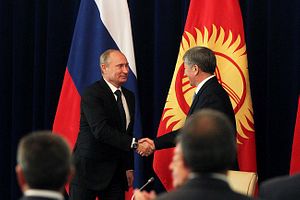With a controversy over proposed gay rights legislation in Kyrgyzstan, the struggle between the United States and Russia for influence in Central Asia – traditionally seen as a conflict over pipelines and military bases – is taking on aspects of a culture war.
Earlier this month, Kyrgyzstan’s parliament passed a law outlawing the promotion of “a positive attitude toward non-traditional sexual relations.” The U.S. embassy in Bishkek issued a statement condemning the legislation, saying that it “fundamentally threatens human rights, Kyrgyzstan’s democratic gains and constitutional guarantees…. No one should be silenced or imprisoned because of who they are or whom they love.” The parliament’s press service shot back, saying that the U.S. was interfering in Kyrgyzstan’s internal affairs and added that while developing the legislation, lawmakers had studied similar laws in several other countries – including eight American states.
The Russian involvement in the legislation is less direct but many observers detect the hand of the Kremlin, which also last year passed a law banning “gay propaganda.” Masha Gessen, writing in the New York Times, noted that Kyrgyzstan is also now considering a law restricting NGOs that receive money from abroad, which also is similar to a law Russia has passed. “In Russia the bills were passed separately, but their packaging in Kyrgyzstan is a perfect reflection of the xenophobic world view Russia has adopted and is now imposing on its allies,” Gessen wrote. The “promotion of Russian-style legislation and ideology” is a “stealthy expansionist project,” she added.
This is not the first time that the gay rights debate in Kyrgyzstan has taken on a U.S.-vs.-Russia cast. When Human Rights Watch issued a report in January criticizing the abuse of gay men at the hands of police in Kyrgyzstan, anti-gay nationalists chose the U.S. embassy in Bishkek as the place to hold a protest. The author of the report said the backlash was “due to discussions in Russian media about LGBT issues.”
In recent years, Russia has increasingly used its conservative ideology as part of its foreign policy toolkit, though it frames that conservatism as a defense against efforts by the U.S. and Europe to impose foreign values on the rest of the world. “We do not claim to be any sort of superpower with a claim to global or regional hegemony; we do not encroach on anyone’s interests, impose our patronage onto anyone, or try to teach others how to live their lives,” Putin said in a speech last year. “But we will strive to be leaders, defending international law, striving for respect and national sovereignty and peoples’ independence and identity.”
While Moscow rarely explicitly identifies gay rights as the target of this conservative push, its media is less circumspect and frequently equates Western values with homosexuality. The U.S., meanwhile, has increasingly made gay rights part of its diplomacy; former Secretary of State Hillary Clinton has bragged about getting into shouting matches with Russian officials over gay rights.
The gay rights debate in Kyrgyzstan is taking place while relations with Russia grow stronger and those with the U.S. weaken. Last year the Kyrgyzstan government refused to renew the agreement allowing for the presence of a U.S. air base in the country, which had operated since 2001 as a rear base for operations in Afghanistan. Meanwhile, it has allowed Russia to expand its air base in the country, and is moving toward joining the Russia-led Customs Union.
But rather than a Kremlin-orchestrated plot, the efforts to repress gays in Kyrgyzstan may be more usefully seen as part of a trend in the country toward the preservation of “traditional” values and Kyrgyz nationalism. The targets of those efforts are perceived outsiders of all stripes – gays, but also Uzbeks (the largest ethnic minority in Kyrgyzstan) and often, Russians. Last year, for example, the country debated a law that would require parental permission for any woman under 23 to travel abroad, apparently targeting young Kyrgyz women who work abroad in Russia. Proponents said the measure was necessary to preserve the Kyrgyz “gene pool.” Another effort sought to forbid the sale of traditional Kyrgyz “kalpak” hats to foreigners because some Russians would wear them to the banya. While rhetoric about gays in the Russian-speaking world may have helped inspire Kyrgyzstan’s anti-gay laws, Kyrgyzstan’s conservative nationalists are operating under their own agenda.

































